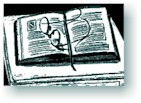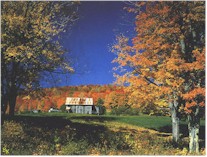Jesus saith unto him, Thomas, because thou hast seen me, thou hast believed: blessed are
they that have not seen, and yet have believed.
John 20:29 KJV

Belief is a truth held in the mind; faith is a fire in the heart.
— Joseph Fort Newton
Daily Meditations by Pat Nordman ©
September 5
"Unless I shall see in His hands the imprint of the nails, and put my finger into the
place of the nails, and put my hand into His side, I will not believe" (John 20:25
NAS). Thomas loved Jesus fervently. Only a few weeks before he wanted to go with Him to
His death (John 11:16).
But how could he, a practical, commonsense type of person, accept that this Man he so
loved, and who had died and was buried, is now resurrected? Impossible! Unless? We find it
so difficult to believe, except on our conditions. But Jesus said, "Blessed are those
who have not seen and yet have believed" (John 20:29).
Pat Nordman ©
Excerpts from today's Spurgeon's Devotions With links to the entire devotion |
|
Spurgeon's Morning for September 5 |
Spurgeon's Evening for September 5 |
| "But Simon’s wife’s mother lay sick of a fever, and anon they tell him of her." - Mark 1:30 |
"Hast thou entered into the springs of the sea?" - Job 38:16 |
Jesus did not pray that you should be taken out of the world, and what he did not pray for, you need not desire. Better far in the Lord’s strength to meet the difficulty, and glorify him in it. |
Why am I so curious to know the reason of my Lord’s providences, the motive of his actions, the design of his visitations? Shall I ever be able to clasp the sun in my fist, and hold the universe in my palm? yet these are as a drop of a bucket compared with the Lord my God. |
September 5 Eze 17:1 -
19:14 |
Current Bible Question |
|
Previous question and Answer:
|
 |
|
But my mouth would encourage you;
comfort from my lips would bring you relief.
Job 16:5 (NIV)
God's Proportions by Cathy Vinson
|
God is where the excitement is! By far! We begin with one body, Abraham's, considered dead regarding reproductive possibilities, and we end up with a harvest countless [without count, innumerable: (a) negative + (euphonic, arithemeo) arithmetic]. Beyond arithemetic. How ultimately desirable to plug into our most resourceful, positive Creator, God and Father! To try to calculate mathematically the proportions of 1 to the sands of the sea or 1 to the galaxies of stars...these are God-like, God-sized proportions. It seems that these are figures He delights to work with. We in turn marvel at Him, and in our marvel see ourselves swept into moving with His Spirit. We start becoming expectant in God-like proportions. "He is able to do exceeding abundantly above all we ask or think..." (Eph 3:20). It may go like this...we wring out of ourselves a thought or request as out of a drying sponge. He goes so far as to answer that request at a level more consistent with Himself. We then become more expectant of His work and ask more; again He not only matches that petition but swings exceedingly far and wide of it. We are overjoyed and move even to a higher level of expectancy, asking in response to even more...If we think an amusement park ride has adventure, what a thrilling cycle to get onto! He will always more than top our best! May we not weighed down by our weak selves. He is alive and on the move! Just now we may be right at the proper place of Abraham, as good as dead...just ready to be a part of birthing unto a fruitful inheritance, a revival, of God-like proportions! Cathy Vinson©
Send a note to Cathy Vinson , the writer of this devotion. |
|
|
Other Whispers from the Wilderness Devotions are found HERE
Music in the Bible
Story music
The Greeks used their songs to sing of their gods and thier mythological battles. The
Hebrews primarily used their songs to praise the one God. There was, however, one link
between the music of the Greeks and that of the Hebrews. This link involved, poetry song
and religion. This link was story music, the epic.
The epic is a long naritive poem presents the deeds of gods or traditional heroes in a
dignified manner. The Iliad and the Odyssey are two examples of Greek epics. These epics
glorify heroic valor and physical prowess. They also provide us with much information of
everyday life in ancient Greece. The Greeks set many of their epics to music. Music made
the epics easier to remember. Rhyming lines made remembering the intricate details and
names of people and places easier.
The Greeks did not use the "story songs" as part of their worship. The Greek
temples were used for sheltering thier gods, not for religious assembly. The use of the
epic song in worship started with the Hebrews. This began centuries before the Greek
epics. The Hebrew worship songs arose out of a religious feeling toward God at important
moments.
The first recorded appearance of story music was when Miriam sang with joy after the Jews
escaped pharaoh's men (Exodus 15:19-21). Many of the Psalms are epics (ex. Psa 114, 136,
137). Sometimes the prophets would burst forth in epic songs (Isa 26, Hab 3).
The Hebrew people did not apply intricate melodies to their story songs. Their tonal range
was probably not very great. They chose rhythm instruments rather than melodic instruments
to accompany their story songs. The melodies of the Psalms were very well known in their
time. They were probably sung in verses by choirs. The Hebrews considered the story songs
an essential part of their worship. Their music sprang from the soul of a people whose
everyday life was religiously orientated.
T |
For out of the heart come evil thoughts, murder, adultery, sexual immorality, theft, false testimony, slander. Matthew 15:19 The integrity of the upright guides them, |
Today's Religion News
From Goshen Web News Service
| Religion
News Feature Story News Summary World News BaptistPress Country Profiles News Links News Archives |
RealAudio format |
All the Rest for September 5 |
|
Return to DM's HOME


